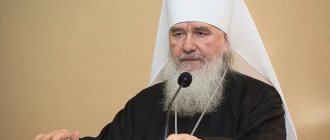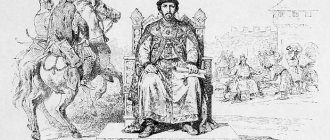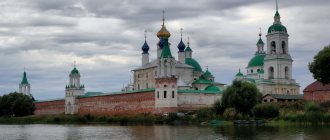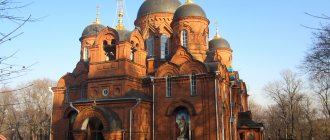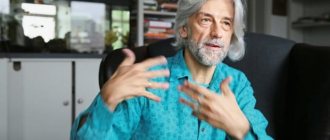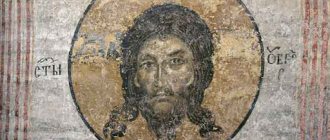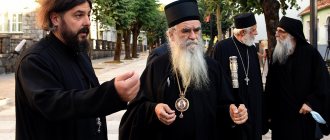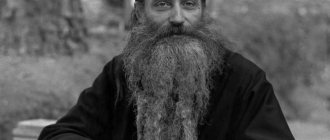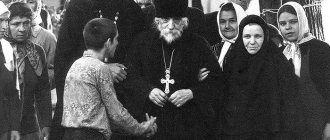| Metropolitan Seraphim (Domnin) |
Seraphim (Domnin)
(born 1977), Metropolitan of Penza and Nizhnelomovsky, head of the Penza Metropolis, holy archimandrite of the Nizhnelomovsky Kazan Monastery, temporary administrator of the Kuznetsk diocese. In the world, Sergey Viktorovich Domnin, was born on September 25, 1977 in the city of Kamenka, Penza region. Baptized in childhood.
In 1984-1994 he studied at secondary school No. 1 in the city of Kamenka, Penza region.
In 1992-1995, he served as an altar server and psalm reader in the Church of the Holy Great Martyr Demetrius of Thessaloniki in the city of Kamenka, Penza region.
In 1995-2000 he studied at the Saratov Theological Seminary.
On July 27, 1997, he was ordained a deacon in the Dimitrievsky Church in the village of Lesnoy Vyas, Luninsky district, Penza region, by Archbishop of Penza and Kuznetsk Seraphim (Tikhonov).
On September 11 of the same year, he was ordained to the rank of priest in the Assumption Cathedral in the city of Penza by the same Eminence.
On October 20, 1997, he was appointed priest of the Assumption Cathedral in Penza.
On June 11, 1998, he was appointed keymaster of the Assumption Cathedral in the city of Penza.
On April 2, 1999, he was tonsured a monk with the name in honor of the Hieromartyr Seraphim (Chichagov) in the church in honor of the Icon of the Mother of God “Life-Giving Source” of the St. Tikhvin Kerensky Monastery in the village of Vadinsk, Penza Region.
In 2000-2009 - inspector of the Penza Theological School.
In 2001-2002 - senior priest of the Intercession Bishops' Cathedral in the city of Penza.
In 2002-2005 - dean of the church in the name of St. Innocent, Bishop of Irkutsk, at the Penza Theological School.
In 2004-2006 - rector of the Dimitrievsky Church in the city of Kamenka, Penza region.
In 2005 he entered the Orthodox St. Tikhon's University for the Humanities, from which he graduated in 2011.
In 2006, on the occasion of Easter, he was elevated to the rank of abbot.
In 2006-2007 - assistant rector of the Intercession Bishops' Cathedral in the city of Penza.
On June 1, 2007, he was appointed executive secretary for diocesan affairs of the Penza diocese.
In 2008, he was appointed rector of the Resurrection parish in the city of Zarechny, Penza region.
In 2009-2010, he served as rector of the Penza Theological School.
In 2011, he was appointed first vice-rector of the Penza Theological Seminary.
| Bishop Seraphim (Domnin) on the day of his episcopal consecration 09/12/2012 |
On July 26, 2012, he was elected Bishop of Kuznetsk and Nikolsk [1].
On August 14, 2012, he was elevated to the rank of archimandrite by Metropolitan Veniamin of Penza and Nizhnelomovsk in the Annunciation Church, which is part of the complex of the Spassky Cathedral under construction in the city of Penza [2].
On August 31, 2012 he was named [3], and on September 12 of the same year he was consecrated [4] Bishop of Kuznetsk and Nikolsky. The ordination in the newly consecrated Church of the Nativity of Christ in the city of Krasnoyarsk was performed by Patriarch of Moscow and All Rus' Kirill (Gundyaev). Concelebrating with him were the metropolitans: Saransk and Mordovian Barsanuphius (Sudakov), Krasnoyarsk and Achinsk Panteleimon (Kutovoy), Penza and Nizhnelomovsk Veniamin (Zaritsky); Archbishop of Rivne and Ostrog Bartholomew (Vashchuk); bishops of Solnechnogorsk Sergius (Chashin), Yenisei and Norilsk Nikodim (Chibisov), Kansk and Boguchansky Filaret (Gusev).
On September 7, 2012, he was relieved of his duties as the first vice-rector of the Penza Theological Seminary and the rector of the Resurrection Prayer House and the Church of the Nativity of the city of Zarechny, Penza region [5].
On December 25, 2013, he was transferred to the Penza See with the assignment of temporary management of the Kuznetsk diocese (until May 18, 2014) and appointed head of the Penza Metropolis [6].
On February 1, 2014, he was elevated to the rank of metropolitan in the Moscow Cathedral of Christ the Savior by Patriarch Kirill of Moscow and All Rus' [7].
On May 30, 2014, he was appointed rector of the Penza Theological Seminary [8] and holy archimandrite of the Nizhnelomovsky Kazan Monastery [9].
On October 23, 2014, he was approved as the holy archimandrite of the Penza Transfiguration Monastery [10]. On December 25 of the same year, based on his own petition, he was released from this position [11].
On July 9, 2022, he was again appointed temporary manager of the Kuznetsk diocese [12].
0lim3144.jpg
In the near future, as part of the project, it is planned to conduct educational lessons with schoolchildren and students, during which they will learn about Zagoskin’s merits. An educational theater marathon is already being held in the region - a series of charity performances “The Yukon Raven” about Lavrenty Zagoskin based on the novel of the same name by Sergei Markov.
Excerpt characterizing Seraphim (Domnin)
Boris came to the Rostovs' box, very simply accepted congratulations and, raising his eyebrows, with an absent-minded smile, conveyed to Natasha and Sonya his bride's request that they be at her wedding, and left. Natasha talked to him with a cheerful and flirtatious smile and congratulated the same Boris with whom she had been in love before on his marriage. In the state of intoxication in which she was, everything seemed simple and natural. Naked Helen sat next to her and smiled equally at everyone; and Natasha smiled at Boris in the same way. Helen's box was filled and surrounded from the stalls by the most distinguished and intelligent men, who seemed to be vying to show everyone that they knew her. Throughout this intermission, Kuragin stood with Dolokhov in front of the ramp, looking at the Rostovs’ box. Natasha knew that he was talking about her, and it gave her pleasure. She even turned around so that he could see her profile, in her opinion, in the most advantageous position. Before the start of the second act, the figure of Pierre appeared in the stalls, whom the Rostovs had not seen since their arrival. His face was sad, and he had gained weight since Natasha last saw him. Without noticing anyone, he walked into the front rows. Anatole approached him and began to say something to him, looking and pointing at the Rostovs’ box. Pierre, seeing Natasha, perked up and hurriedly, along the rows, went to their bed. Approaching them, he leaned on his elbow and, smiling, spoke to Natasha for a long time. During her conversation with Pierre, Natasha heard a man’s voice in Countess Bezukhova’s box and for some reason learned that it was Kuragin. She looked back and met his eyes. Almost smiling, he looked straight into her eyes with such an admiring, affectionate look that it seemed strange to be so close to him, to look at him like that, to be so sure that he liked you, and not be familiar with him. In the second act there were paintings depicting monuments and there was a hole in the canvas depicting the moon, and the lampshades on the ramp were raised, and trumpets and double basses began to play, and many people in black robes came out to the right and left. People began to wave their arms, and in their hands they had something like daggers; then some other people came running and began to drag away that girl who had previously been in a white, and now in a blue dress. They didn’t drag her away right away, but sang with her for a long time, and then they dragged her away, and behind the scenes they hit something metal three times, and everyone knelt down and sang a prayer. Several times all these actions were interrupted by enthusiastic screams from the audience. During this act, every time Natasha glanced at the stalls, she saw Anatoly Kuragin, throwing his arm over the back of the chair and looking at her. She was pleased to see that he was so captivated by her, and it did not occur to her that there was anything bad in this. When the second act ended, Countess Bezukhova stood up, turned to the Rostovs' box (her chest was completely bare), beckoned the old count to her with a gloved finger, and, not paying attention to those who entered her box, began to speak kindly to him, smiling. “Well, introduce me to your lovely daughters,” she said, “the whole city is shouting about them, but I don’t know them.” Natasha stood up and sat down to the magnificent countess. Natasha was so pleased by the praise of this brilliant beauty that she blushed with pleasure. “Now I also want to become a Muscovite,” said Helen. - And aren’t you ashamed to bury such pearls in the village! Countess Bezukhaya, rightly, had a reputation as a charming woman. She could say what she did not think, and especially flatter, completely simply and naturally. - No, dear Count, let me take care of your daughters. At least I won't be here for long now. And you too. I will try to amuse yours. “I heard a lot about you back in St. Petersburg, and I wanted to get to know you,” she told Natasha with her uniformly beautiful smile. “I heard about you from my page, Drubetsky. Did you hear he's getting married? And from my husband’s friend Bolkonsky, Prince Andrei Bolkonsky,” she said with special emphasis, thereby hinting that she knew his relationship to Natasha. “She asked, in order to get to know each other better, to allow one of the young ladies to sit in her box for the rest of the performance, and Natasha went over to her. In the third act, a palace was presented on stage, in which many candles were burning and paintings depicting knights with beards were hung. In the middle stood probably the king and queen. The king waved his right hand, and, apparently timid, sang something badly and sat down on the crimson throne. The girl, who was first in white, then in blue, was now wearing only a shirt with her hair down and stood near the throne. She sang sadly about something, turning to the queen; but the king sternly waved his hand, and men with bare legs and women with bare legs came out from the sides and began to dance all together. Then the violins began to play very subtly and cheerfully, one of the girls with bare thick legs and thin arms, separated from the others, went backstage, straightened her bodice, went out to the middle and began to jump and quickly beat one leg against the other. Everyone on the ground clapped their hands and shouted “Bravo”. Then one man stood in the corner. The orchestra started playing cymbals and trumpets louder, and this one man with bare legs began to jump very high and mince his feet. (This man was Duport, who received 60 thousand a year for this art.) Everyone in the stalls, in the boxes and in the area began to clap and shout with all their might, and the man stopped and began to smile and bow in all directions. Then others danced, with bare legs, men and women, then again one of the kings shouted something to the music, and everyone began to sing. But suddenly there was a storm, chromatic scales and diminished seventh chords were heard in the orchestra, and everyone ran and again dragged one of those present backstage, and the curtain fell. Again a terrible noise and crackling arose between the spectators, and everyone with delighted faces began to shout: Dupora! Dupora! Dupora! Natasha no longer found this strange. She looked around her with pleasure, smiling joyfully. – N'est ce pas qu'il est admirable – Duport? [Isn’t Duport amazing?] said Helene, turning to her. “Oh, oui, [Oh, yes,”] Natasha answered. During the intermission, there was a smell of cold in Helen's box, the door opened and, bending down and trying not to catch anyone, Anatole entered. “Let me introduce you to my brother,” Helen said, nervously flicking her eyes from Natasha to Anatole. Natasha turned her pretty head over her bare shoulder to the handsome man and smiled. Anatole, who was as good-looking up close as he was from afar, sat down next to her and said that he had long wanted to have this pleasure, ever since the Naryshkin Ball, at which he had the pleasure, which he had not forgotten, of seeing her. Kuragin was much smarter and simpler with women than in male society. He spoke boldly and simply, and Natasha was strangely and pleasantly struck by the fact that not only was there nothing so terrible about this man about whom they talked so much, but that on the contrary, he had the most naive, cheerful and good-natured smile. Kuragin asked about the impression of the performance and told her about how Semenova fell while playing in the last performance. “You know, Countess,” he said, suddenly addressing her as if he were an old acquaintance, “we are organizing a carousel in costumes; you should take part in it: it will be a lot of fun. Everyone gathers at the Karagins'. Please come, right? - he said. As he said this, he did not take his smiling eyes off Natasha’s face, neck, and bare arms. Natasha undoubtedly knew that he admired her. She was pleased with this, but for some reason his presence made her feel cramped and heavy. When she was not looking at him, she felt that he was looking at her shoulders, and she involuntarily intercepted his gaze so that he would look better at her eyes. But, looking into his eyes, she felt with fear that between him and her there was absolutely no barrier of modesty that she had always felt between herself and other men. She, without knowing how, after five minutes felt terribly close to this man. When she turned away, she was afraid that he would take her bare hand from behind and kiss her neck. They talked about the simplest things and she felt that they were close, like she had never been with a man. Natasha looked back at Helen and her father, as if asking them what this meant; but Helen was busy talking with some general and did not respond to her glance, and her father’s gaze did not tell her anything other than what he always said: “It’s fun, well, I’m glad.”
0lim2996.jpg
The project organizers hope that the expected results of the Yukon Raven project, thanks to a large-scale information campaign, will also influence the development of the region's tourist attractiveness. Projects of the Penza regional branch of the Russian Geographical Society are traditionally supported by the Government of the Penza region and the Executive Directorate of the Russian Geographical Society. The leaders of the Penza regional branch of the Russian Geographical Society are confident that the further implementation of the project supported by the Presidential Grants Fund will be carried out at a high professional level. The fort will open in the summer of 2022.
Prepared by the Chairman of the Media Council Oleg Tkachev, photo material by Boris Tishulin, Vladimir Sokolov
05.jpg
Let us remind you that the “Yukon Raven” project involves the implementation of a complex of works and large-scale events that will contribute not only to the return “to the native shores” of the good name of the famous navigator, famous traveler Lavrenty Alekseevich Zagoskin, but also to popularize the role of Russian pioneers thanks to whom our country grew with new territories and seas, became a great sea and land power.
“We are grateful for today’s event, because it gives a new spiritual impulse to all of us, both the project organizers and the village residents. We will continue to work together to revive the small homeland of the great traveler, implement projects in memory of Russian pioneers, so that future generations will know and be proud of their exploits,” said Igor Pantyushov, chairman of the Penza regional branch of the Russian Geographical Society.
Links
USSR John (Pommer) • Boris (Lentovsky) • Leonty (Ustinov) • Peter (Sokolov) • Philip (Perov) • Kirill (Sokolov) • Alexy (Kuznetsov) • Iriney (Shulmin) • Abraham (Churilin) • Feodor (Smirnov) • Irakli (Popov) • Kirill (Pospelov) • Mikhail (Postnikov) • Jerome (Zakharov) • Leonid (Lobachev) • Theodosius (Pogorsky) • Polycarp (Priymak) • Hilarion (Prokhorov) • Melchizedek (Lebedev) • Seraphim (Tikhonov) Russia Seraphim (Tikhonov) • Filaret (Karagodin) • Veniamin (Zaritsky) • Seraphim (Domnin)
12.jpg
Mikhailovsky Redoubt is a wooden model of a fortified trading post in Alaska, founded by the Russian-American Company in 1833. All structures of the model of the Russian Alaskan fort are created according to ancient sketches, sketches and drawings. It will become a new tourist attraction in the Penza region. It was no coincidence that the village of Nikolaevka was chosen as the site for the construction of the redoubt. It is here that the small homeland of the Russian naval officer, traveler, and legendary explorer of Alaska Lavrenty Zagoskin is located.
